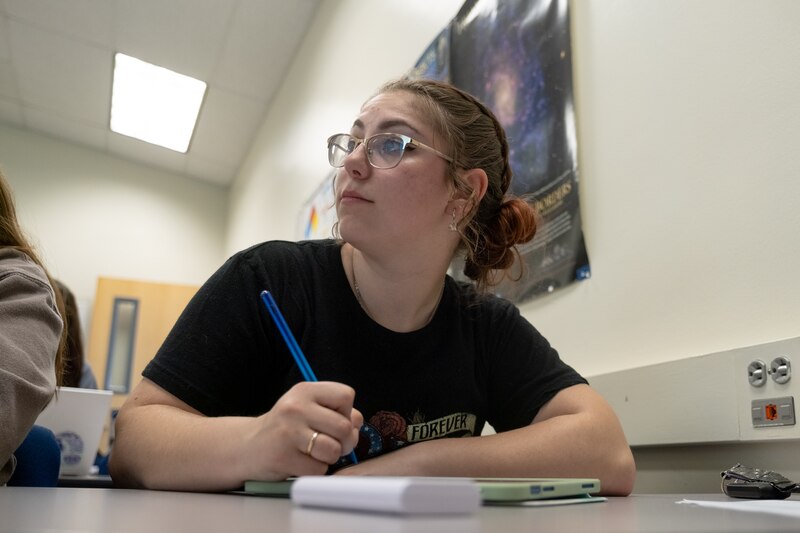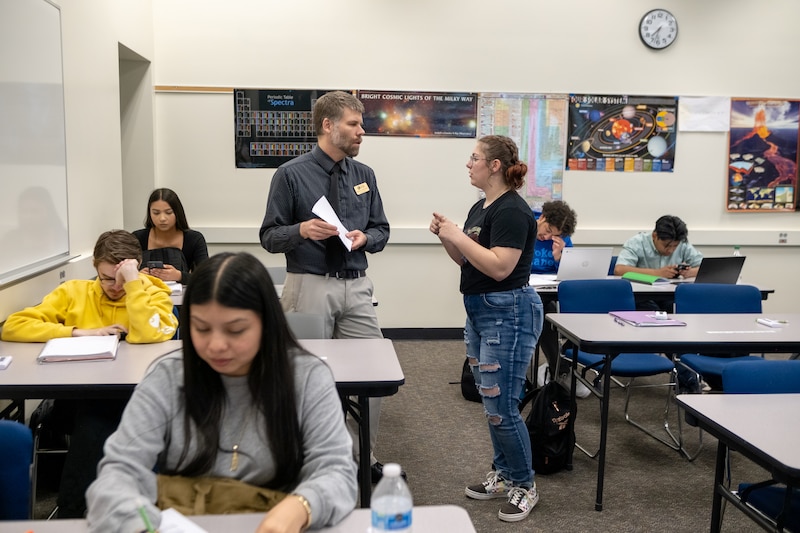Sign up for our free monthly newsletter Beyond High School to get the latest news about college and career paths for Colorado’s high school grads.
The routes to two- and four-year colleges didn’t fit Maryssa McCray’s ambitions.
McCray, 19, wants to be an officer in the Air Force. But her SAT score wasn’t high enough to enroll in the U.S. Air Force Academy in Colorado Springs. Life events also got in the way. Her Kia Sportage got stolen. She also experienced the shock of her family needing to put down two of their dogs.
When she heard about the ASCENT program from her Rangeview High School counselors, she jumped at the chance. The program extends high school by a fifth year, but allows students to attend college in that fifth year. She enrolled at the Community College of Aurora as she figured out how to join the Air Force.
“I wasn’t necessarily ready to leave my family, so it kind of gave us both a little bit more time to get situated,” she said.
For students like McCray, Colorado has offered numerous college-level opportunities, typically free of cost, while they attend high school. Some options introduce college-level classes as early as ninth grade. Others, like ASCENT, pay for students to attend college on campus at no cost and can help prevent them from dropping out of high school.
But state lawmakers are now digging deeper into the value and outcomes of these programs after a task force highlighted problems like a lack of cohesion with these programs. During this year’s legislative session, lawmakers placed an enrollment cap on ASCENT, which stands for Accelerating Students through Concurrent Enrollment, as part of broader efforts to scrutinize the program and others that give students college and workforce experience.
While lawmakers say they’re dedicated to workforce and college programs in high school, ASCENT has faced perhaps the most skepticism because of the minimal data about it and its rising costs as more students participate.
It’s one of the state’s oldest concurrent and dual enrollment programs; lawmakers created ASCENT in 2009. Yet there’s still not a lot of information about the classes students take in college, whether they leave with a credential or degree, or whether students enter into good-paying careers, partly because collecting this data is not required.
However, the information that is available suggests ASCENT is not fulfilling its original mission to the extent people hoped. Originally aimed at helping students who might otherwise lack access to college, such as students without documentation, data shows that half of participants are white and three-quarters are middle-class.
District leaders say there’s value in ASCENT, even if other programs overlap somewhat with the experience students get. But others worry about the expense and an outdated mission that doesn’t align with workforce goals.

For students like McCray, the program allowed her time to figure out her next steps, instead of making a college decision that didn’t fit or not going to college at all. She’s not sure what she would have done without the program.
“I knew at least for a year I can get through college, learn what I want to do and get used to it, and then figure things out from there,” McCray said.
Colorado report highlights fragmented dual enrollment options
About 90% of jobs that can support a family of three require a postsecondary education, such as a certificate or degree, according to a recent state report.
Yet recent graduation data shows only about half of all Colorado high school graduates will head to college. Many of them — especially Black, Hispanic, and Native American students — will never finish college or enter a workforce training program.
In response, Colorado has pushed college courses down to high school students to help them get college experience, a workforce credential, or even graduate with a higher education degree. Or in the case of extended high school programs, like ASCENT, the state has offered to pay for a student’s first year or years in college.
But a report released in December by a state task force detailed a fragmented early career and college system that’s in need of streamlining.
Colorado has a dizzying number of such opportunities for high school students. The crowded landscape can cause confusion.
Each program is distinct, and not all of them are administered by the same office. That can make it difficult for families and students to understand their options.
The different programs also have disparate reporting requirements, creating difficulties for measuring how programs are working as a whole and individually.
Colorado lawmakers said the task force’s report, which they authorized, outlined a path toward more accountability and would help them understand what is and isn’t working for students.

Colorado lawmakers halt ASCENT’s expansion
Lawmakers enacted a series of bills this year to expand and evaluate college and workforce education programs after the report.
The bills direct the state to do a comprehensive financial study to analyze how much the programs cost the state and districts, compile long-term data on program outcomes, expand opportunities, and seek to find a comprehensive direction when it comes to college and career education.
The growth — and the price tag — of ASCENT in particular raised lawmakers’ eyebrows.
Colorado had spent about $3.8 million a year on the program prior to 2022. That year, in the name of increasing opportunities for students statewide, lawmakers lifted a 500-student cap for ASCENT.
That’s led to rapid growth for ASCENT. Next year, 1,700 students are expected to participate, up from 1,200 this year. As more of them have jumped at the chance at free college, the state is projecting it will spend about $17 million on ASCENT next year, more than quadruple what the program cost in 2022.
Lawmakers decided this year to cap the program at next year’s student enrollment levels, and a fiscal analysis says changes will bring down costs by about $1 million. They also approved a mandate for students to fill out the Free Application for Federal Student Aid, known as the FAFSA. That could offset some of the state’s costs if students are eligible for and receive federal grants.
The new law also mandates further study of the program’s cost and outcomes.
Many ASCENT students enroll at community colleges in Colorado, which costs about $4,692 for full-time enrollment of 30 credit hours a year. Yet the state provides about $10,000 a year to districts for every student in the ASCENT program. Aside from tuition, the funding covers districts’ administration of the program. But that hasn’t assuaged officials’ concerns about costs.
“There are valid questions about whether this program is actually helping the students it is intended to help,” said Rep. Shannon Bird, a Westminster Democrat and Joint Budget Committee chair, during a floor hearing on the bill that targeted ASCENT. “And we need to make sure that we get the biggest return for every dollar we spend.”
ASCENT helps students get college experience
The ASCENT program helped Jennifer Martin find her footing in college.
Martin, 19, almost took a gap year after she graduated from Aurora’s Gateway High School in 2023 because she didn’t feel ready for college and worried about the cost.
However, counselors helped convince Martin to participate in ASCENT, which would provide support from Aurora Public Schools during her year at the Community College of Aurora.

“My mentality was to save up enough money to where I could afford the tuition and pay for the costs of living on campus,” she said.
But other programs might achieve the same goal while offering a clearer focus.
Michelle Romero, the postsecondary & workforce readiness director for the Colorado Department of Education, said newer extended high school programs that have come after ASCENT steer students into specific careers.
For example, the P-TECH program began in 2016 and also gives students the option of extending high school enrollment. But it is designed to get students into a science, technology, engineering, or math pathway in ninth grade. The program offers six years of high school, and allows students to graduate with an associate degree in a relevant field. Some P-TECH students have graduated in four years and never needed more time in high school, Romero said.
Meanwhile, the state’s Teacher Recruitment Education and Preparation program started in 2021 to help address the state’s teacher shortage. The program also extends high school enrollment. It pays for students who want to become teachers to take college classes for up to two years.
ASCENT students, on the other hand, can take whichever college classes they want. And the state doesn’t even track if they stay in college beyond their ASCENT year.
When discussing ASCENT student outcomes, Romero said: “Do they stick with a certain pathway? Do they finish? Do they end up with some type of credential, associate certificate, or do they then transfer to a four year? I couldn’t tell you.”
Colorado educators give ASCENT mixed reviews
Bill Summers, Cañon City High School principal, had about 30 students in ASCENT this year. Next year, he projects participation will more than double to 70 students. But he said it’s hard to evaluate if ASCENT is putting students on a path to a good career and economic mobility.
“It can be both a criticism and praise that students are allowed to take whatever they want, which is great for experimenting or seeing what a student wants to do,” he said of ASCENT. “But are students just wasting their time taking courses that they don’t need? Or is it actually going to give them a benefit?”
Dave West, director of college and career success for Aurora Public Schools, sees the purpose of concurrent enrollment programs differently. Three-quarters of Aurora students are from relatively low-income backgrounds, and West said ASCENT and other programs help these students realize their college dreams.
“For me, concurrent enrollment is about opening opportunities and additional doors that our students may not even realize at this point in time exist,” he said.
Although it is not required by the state, Aurora Public Schools uses ASCENT funding to pay students’ college fees and provide them with a stipend for books.
West said he understands the program is costly, but hopes lawmakers work with districts in crafting next steps for ASCENT. Students who have experiences like McCray and Martin show it can be effective, he said.

Martin will graduate from the Community College of Aurora in the fall with her associate degree and plans to go to the University of Denver. McCray graduated with her associate degree in science this spring. She will soon enlist in the Air Force.
“It helped me figure out where I wanted to go,” McCray said about ASCENT. “I got my associates and that feels like such an accomplishment. Like, I’ve actually done it.”
Jason Gonzales is a reporter covering higher education and the Colorado legislature. Chalkbeat Colorado partners with Open Campus on higher education coverage. Contact Jason at jgonzales@chalkbeat.org.

